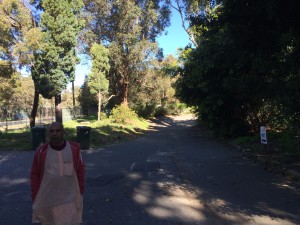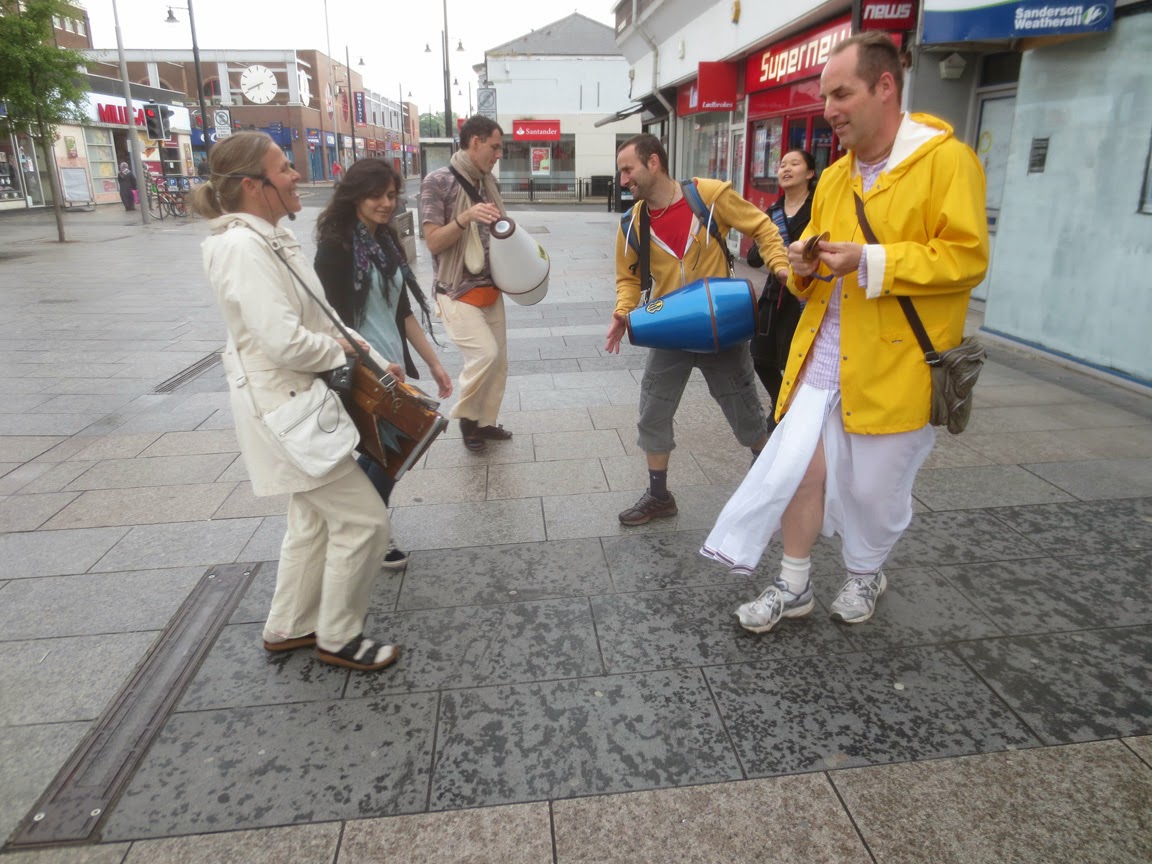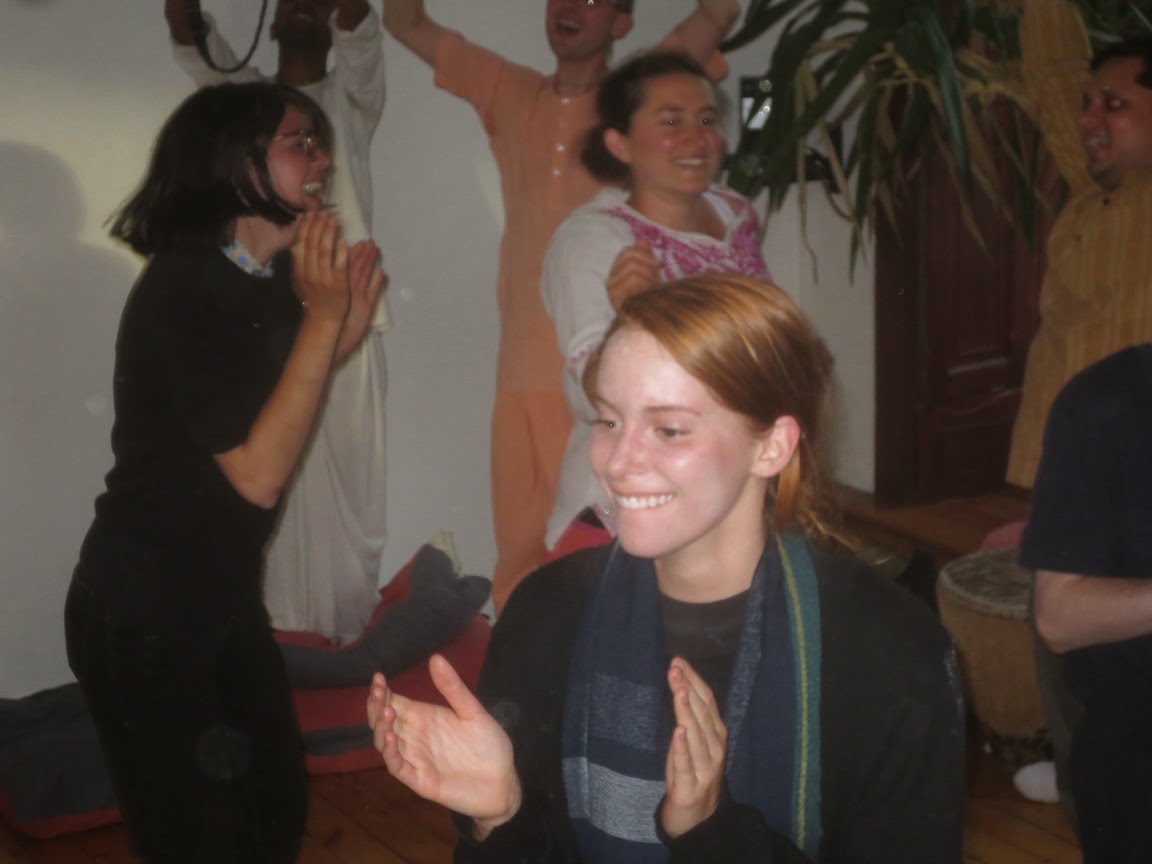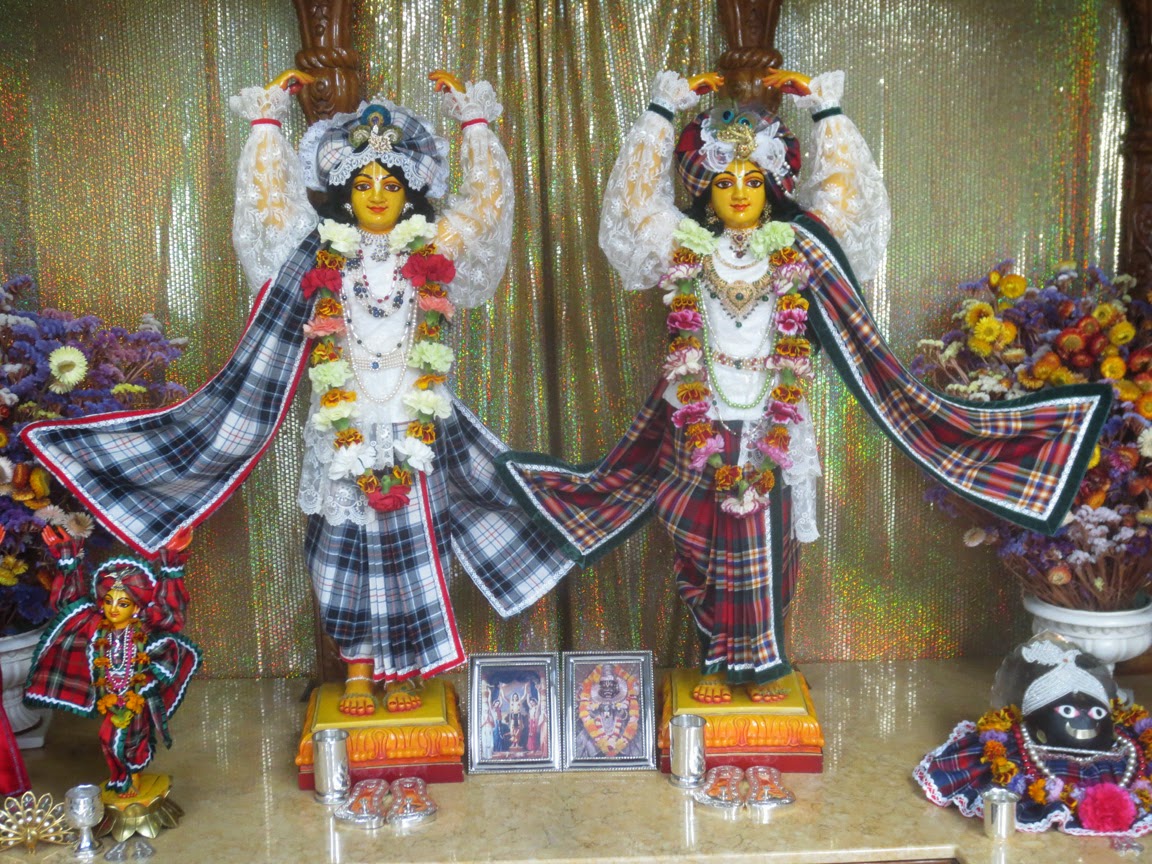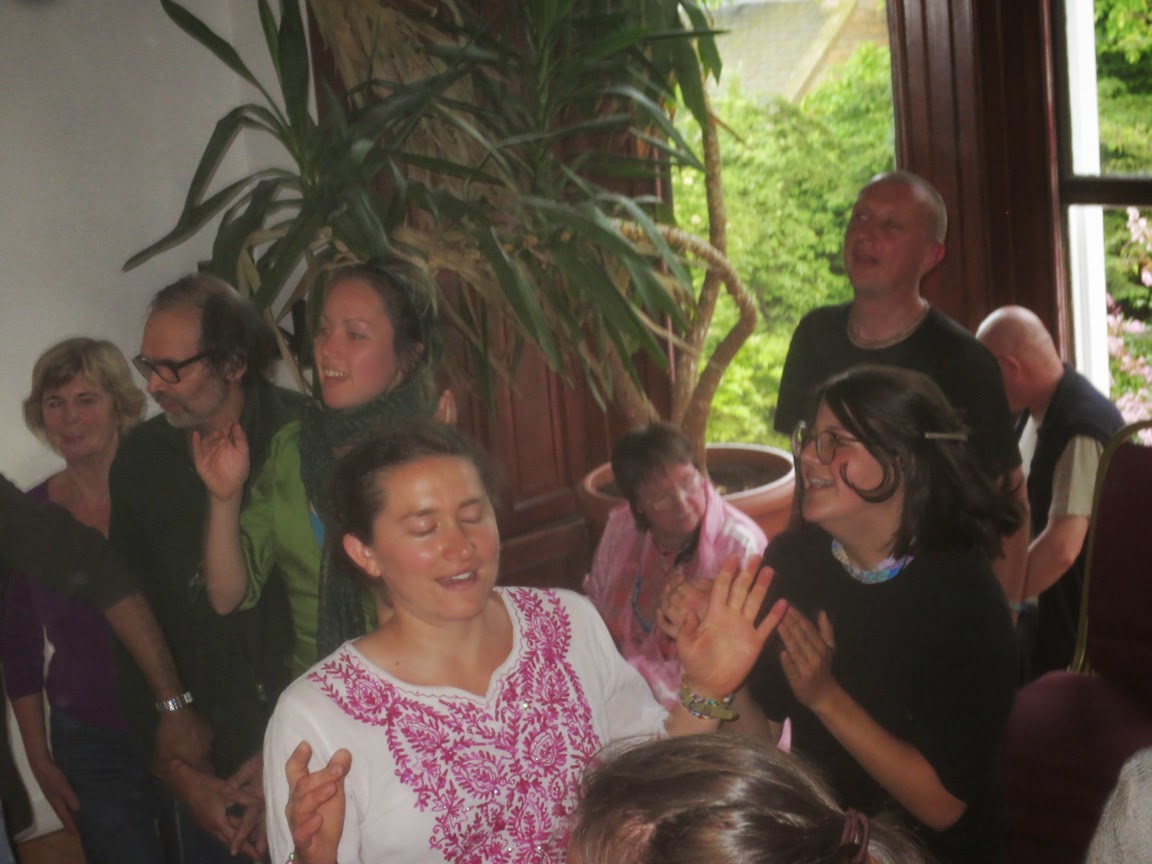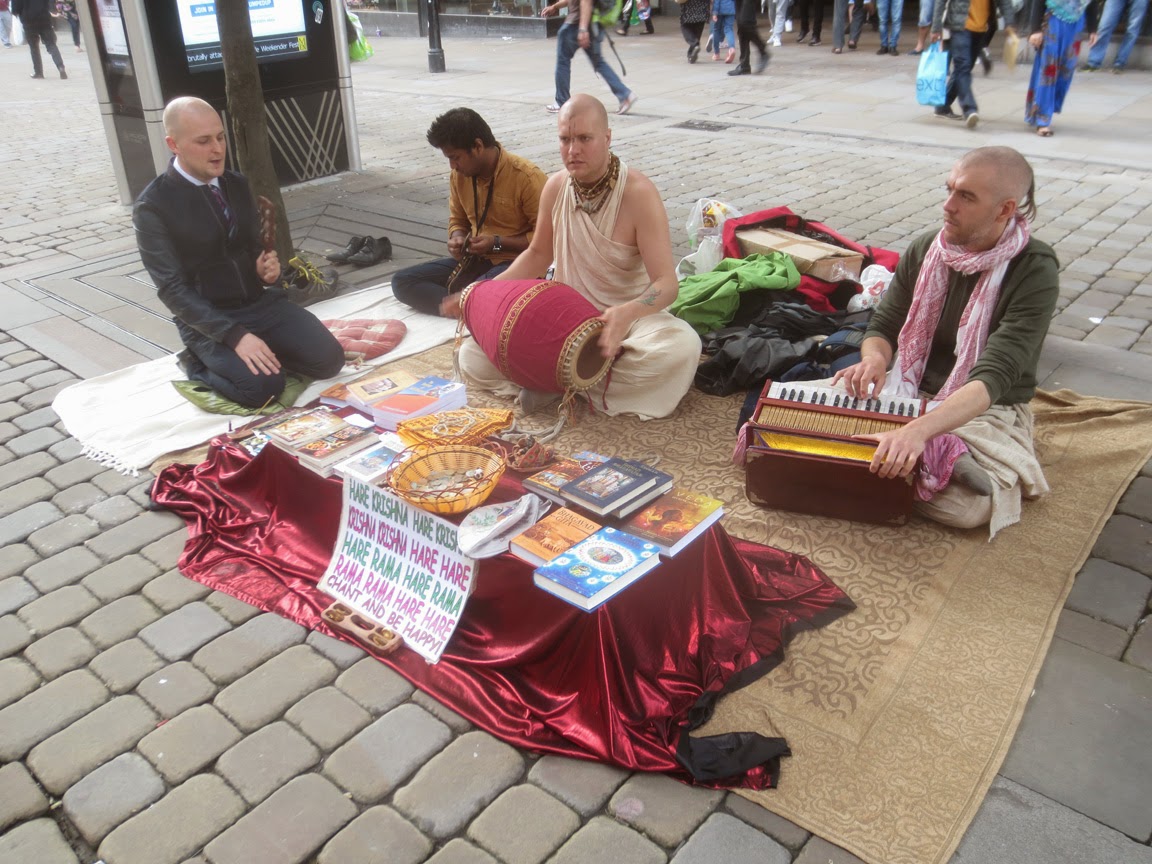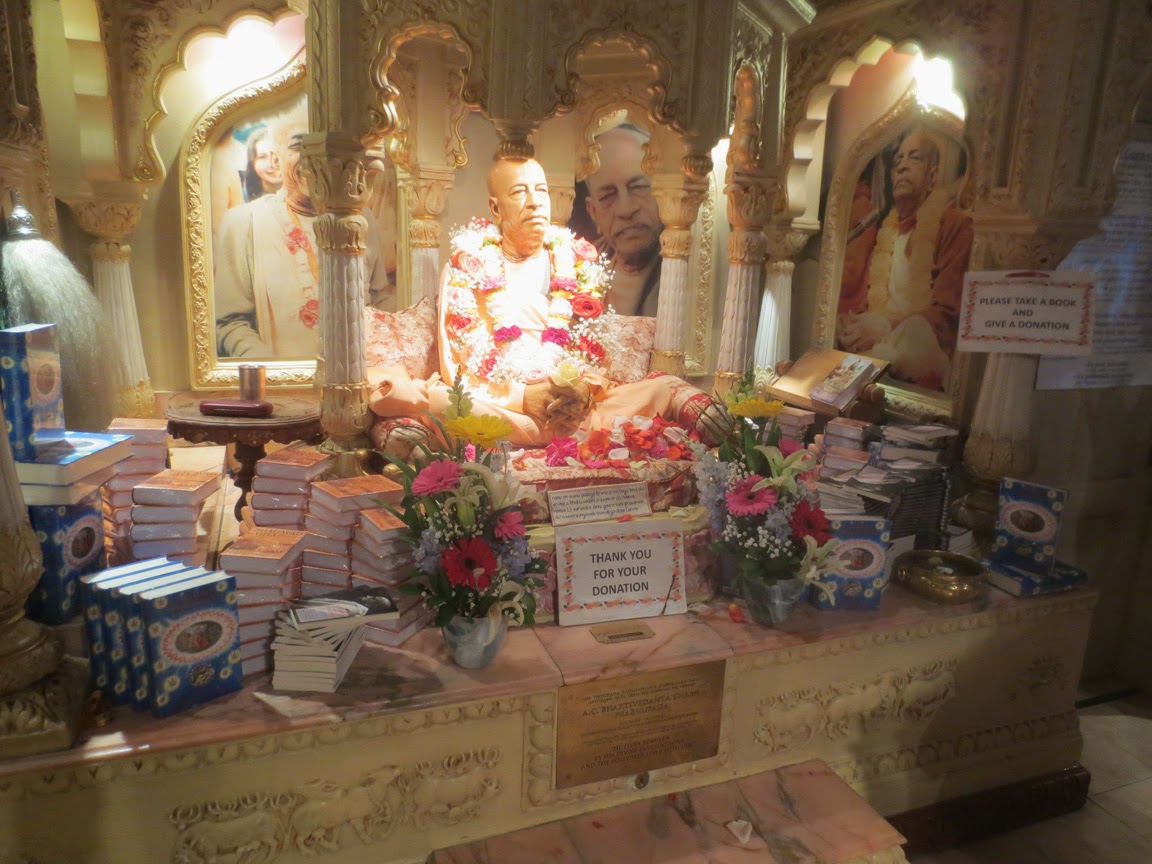Simple process, supreme benefit
HG Mathuranatha Prabhu / SB 10.65.18
→ Kalachandji's Audio Archive
Just Keep Going?
→ The Enquirer
Just Keep Going?
Most of the time, if you are struggling to practice bhakti-yoga you will hear this advice: “Don’t give up, just keep going.”
There is some value in this, but also a flaw.
If a monkey is struggling to pull a banana out of a jar, we can praise the virtue of his tenacity, and that tenacity might even evoke the compassion of an onlooker — but tenacity itself doesn’t get the banana out of the jar.
In any endeavor, including bhakti-sādhana, brute-force is not as wise as efficiency.
We can try to sweat it out and keep trying to chant more (and more) “rounds” of mantras. But it would become easy to chant hundreds of rounds if we had strong attraction to Krishna. So where should the effort primarily go, to the number of rounds or to the quality of attraction to Krishna?
The distinction is not always so clear, because one of the ways to develop more attraction to Krishna is to chant his name more often. But it is really a question of focus. The focus should not be on upholding an externally measurable huge quota of sādhana. The focus should be on deepening our actual feelings of affection for Śrī Krishna.
This is why, next to chanting Krishna’s name, the most important of all sādhanas is to hear the Śrīmad Bhāgavatam from those who can relish its beauty. Exposing ourselves to the beauty of Krishna revealed by the realized speakers of Śrīmad Bhāgavatam will cause us to fall in love, really, with Krishna. Then, with relatively little effort, our chanting will become attentive, emotive, and copious!
So chant an amount that is a realistic challenge for your current level of realizing the beauty of Krishna, and simultaneously hear the Śrīmad Bhāgavatam every day from people who are clearly, deeply in love with Krishna and cannot stop discussing him.
The willingness to change
→ KKSBlog
(Kadamba Kanana Swami, 16 April 2014, Durban, South Africa, Srimad Bhagavatam 1.7.34)
Transcribed by Radhadyuti dd
 It is interesting that in the purports of the Bhagavad-gita, Srila Prabhuapda describes the mode of goodness. Then Srila Prabhupada does not say that you have to be in the mode of goodness, which is impossible. How can we be in the mode of goodness? He says you have to associate with the mode of goodness! So, that we can do!
It is interesting that in the purports of the Bhagavad-gita, Srila Prabhuapda describes the mode of goodness. Then Srila Prabhupada does not say that you have to be in the mode of goodness, which is impossible. How can we be in the mode of goodness? He says you have to associate with the mode of goodness! So, that we can do!
And by associating in the mode of goodness, we cultivate the mode of goodness. Of course, there are so many rules – sit properly, eat properly, chant properly… everything properly, properly, properly. But this willingness to change must be there. That sense of rebelliousness, “I want to do it my way,” is a sign of passion and ignorance.
We see that the demigods are situated in the mode of goodness; they are always trying to do things properly. We read scriptures and that willingness must be there:
tad viddhi pranipatena pariprasnena sevayaupadeksyanti te jnanam
jnaninas tattva-darsinah (Bhagavad-gita 4.34)
We must approach a bonafide spiritual master in a humble and submissive mood. A mood willing to hear and willing to change!
The Soul Is Hearing
→ Japa Group
Is the Gita’s teaching that women are sinful resposible for female infanticide?
→ The Spiritual Scientist
While writing articles should we write about topics connected with our personal lives or about unconnected topics?
→ The Spiritual Scientist
Ratha Yatra in Stockholm, Sweden (Album 20 photos)
→ Dandavats.com
 Stockholm is the capital of Sweden. In the age of Kali, intelligent persons perform congregational chanting to worship the incarnation of Godhead who constantly sings the names of Krishna. Although His complexion is not blackish, He is Krishna Himself. He is accompanied by His associates, servants, weapons and confidential companions. SB 11.5.32 Read more ›
Stockholm is the capital of Sweden. In the age of Kali, intelligent persons perform congregational chanting to worship the incarnation of Godhead who constantly sings the names of Krishna. Although His complexion is not blackish, He is Krishna Himself. He is accompanied by His associates, servants, weapons and confidential companions. SB 11.5.32 Read more › Sivarama Swami recites a funny past time of Srila Prabhupada (2 min video)
→ Dandavats.com
 Jaya Srila Prabhupada! Read more ›
Jaya Srila Prabhupada! Read more › Prabhupada Letters :: Anthology 2014-07-14 14:31:00 →
Prabhupada Letters :: 1968
Prabhupada Letters :: Anthology 2014-07-14 14:25:00 →
Prabhupada Letters :: 1971
Prabhupada Letters :: Anthology 2014-07-14 14:20:00 →
Prabhupada Letters :: 1972
Prabhupada Letters :: Anthology 2014-07-14 14:19:00 →
Prabhupada Letters :: 1972
Prabhupada Letters :: Anthology 2014-07-14 14:17:00 →
Prabhupada Letters :: 1973
Prabhupada Letters :: Anthology 2014-07-14 14:14:00 →
Prabhupada Letters :: 1974
Prabhupada Letters :: Anthology 2014-07-14 14:12:00 →
Prabhupada Letters :: 1975
Prabhupada Letters :: Anthology 2014-07-14 14:08:00 →
Prabhupada Letters :: 1975
Radha Govinda asks what are the goals, character, conduct – definition – of a true sadhaka
→ SivaramaSwami.com
The post Radha Govinda asks what are the goals, character, conduct – definition – of a true sadhaka appeared first on SivaramaSwami.com.
Awakening the Soul: Never Stop Chanting – Dubai
→ ISKCON News

Surprisingly, in our modern high-paced high-controlled life style the thing that is out of control is our own mind. Though there is a simple process that can help to bring the mind back under control. This 5 min documentary by Syam Gopal Das and Vijay Radhika Dasi is about Awakening the Soul, an event lead by BB Govinda Swami, that delivers such an experience. June 31, 2014, Dubai.
Malaga Evening Lecture On “Śrīla Prabhupāda, The Founder-Ācārya Of ISKCON”
Bhakti Charu Swami
July 14th, 2014 – Darshan
→ Mayapur.com
The post July 14th, 2014 – Darshan appeared first on Mayapur.com.
Festival program floods with nectar the “Tough Town” of Mielno, coastal village in north-western Poland (Album 124 photos)
→ Dandavats.com
 Indradyumna Swami: Mielno has a reputation of being a tough town especially during the summer when thousands of young men and women come to drink and party in the many bars and discos around town. But for 3 days this week our harinama party and festivals flooded Mielno with the nectar of the holy names. Both the gentle and the ruffians chanted and danced along with us in great ecstasy. All glories to Sri Krsna samkirtan! Read more ›
Indradyumna Swami: Mielno has a reputation of being a tough town especially during the summer when thousands of young men and women come to drink and party in the many bars and discos around town. But for 3 days this week our harinama party and festivals flooded Mielno with the nectar of the holy names. Both the gentle and the ruffians chanted and danced along with us in great ecstasy. All glories to Sri Krsna samkirtan! Read more › Ratha-Yatra 2014 Budapest, Hungary (Album 124 photos)
→ Dandavats.com
 My dear King, although Kali-yuga is an ocean of faults, there is still one good quality about this age: Simply by chanting the Hare Krishna maha-mantra, one can become free from material bondage and be promoted to the transcendental kingdom. SB 12.3.51 Read more ›
My dear King, although Kali-yuga is an ocean of faults, there is still one good quality about this age: Simply by chanting the Hare Krishna maha-mantra, one can become free from material bondage and be promoted to the transcendental kingdom. SB 12.3.51 Read more › Audio Album: Heart and Soul
→ KKSBlog
Heart and Soul
Released in 2014, at the Durban Ratha Yatra and is now available for the rest of the world…

That what matters most, is music that touches your heart & soul and awakens your spiritual quest to self realisation. Heart and Soul has a spiritual background, a sanctity that is like worship. Emerge, purify and elevate to start your devotional life.
This album by Kadamba Kanana Swami was recorded, mixed & mastered in Sydney Australia under the supervision of Jananivasa & Akash.
Get it Now
Track List
1. Open Mind – 02:37
2. In the footsteps of the Master – 12:34
3. Breakthrough – 19:12
4. Internal Growth – 07:29
5. Heart and Soul – 21:09
6. Yoga of Devotion – 12:00
Album Info
Artist Name: Kadamba Kanana Swami
Composer: Kadamba Kanana Swami
Produced: Australia – Padmanabha, Europe – Jananivasa
Date: 9 Mar 2014
Recordings, mixing, mastering: Daniel Antix @ Locked Up Studios, Sutherland, Australia
Artwork: Caterina Baldi
Album Artists
Kadamba Kanana Swami: Lead vocals, Harmonium
Jananivasa: Mrdanga, Piano
Emanuel Lieberfreund: Cajon, tambourine, flutes, woodwind, shakers and a bit of soprano, saxophone lute
Kyle Taylor: Upright & Electric Bass
Sugriva: Karatalas
Sveta Ganga dd, Rama das, Alana Rowe, Laura Cusack, Gopinath Badhra and Akash Dhurbarry: Chorus vocals
More Album photos





Special Bonus Pack
Get Heart and Soul + Waves of Mercy together for a bonus price!!
Budapest Ratha-yatra video
→ SivaramaSwami.com
https://www.youtube.com/watch?v=h2GNGf0z0nk
The post Budapest Ratha-yatra video appeared first on SivaramaSwami.com.
Srimad Bhagavatam 4.2.17-18 Bhakti Caru Swami
→ Gouranga TV - The Hare Krishna video collection
Srimad Bhagavatam 4.2.17-18 Bhakti Caru Swami
Mahabharata characters 56 – Arjuna 19 – The difficult disciplining of Ashvatthama
→ The Spiritual Scientist
This talk is a part of the "Fascinating Mahabharata Characters" series. To know more about this course, please visit: bhakticourses.com
Practice yoga by bringing the mind on Krishna repeatedly
→ The Spiritual Scientist
HG Nityananda Chandra Prabhu – Six Demons Sons of Devaki
→ Kalachandji's Audio Archive
HG Mathuranatha Prabhu / CC Madhya-lila
→ Kalachandji's Audio Archive
HG Deva Darsana Prabhu / SB 10.65.17
→ Kalachandji's Audio Archive
HG Rupanuga Prabhu / SB 10.65.16
→ Kalachandji's Audio Archive
Experiences Ecstatic Bliss
→ Japa Group

"The devotee who takes shelter of the pure name accepts the absolute authority of the Vedas, and quickly attains the nectar of the name, Krsnaprema. The sruti proclaims that by chanting the holy name of Hari, one experiences ecstatic bliss. Further, it is declared that the eternally liberated residents of the spiritual sky are always engaged in chanting the pure name."
Harinama Cintamani
Perth New Centre
→ Ramai Swami
The devotees at Perth temple have decided to transfer their temple in Kalamunda at the top of the hill to a new residence at Maidavale at the bottom of the hill.
Grazing and climate change
→ Servant of the Servant
If we stop animal slaughter on a mass scale, if we go back to our roots of simple life, then it is doable, our planet can return to its pristine self and serve mankind with glory.
Hare Krishna
Saving Private Junkie
→ KKSBlog
(Kadamba Kanana Swami, 20 June 2014, Stockholm, Sweden, Caitanya Caritamrta Madhya 22.75)
Sometimes, it is nice to remember that kind of magic shortcut of giving out the mercy. It is amazing what mercy one can give. I sometimes tell the story of how I was in the Netherlands and I had to do a program in Rotterdam and we were going by bus. I was waiting with a devotee for the bus, a new devotee, and just then, you know, a junkie comes by. It is full of junkies there. So this junkie comes and he wants some money, you know what I mean, and I did not give anything because, well if you give to junkies…
So, I used all my India experience of what to do if you want to get rid of a beggar! See, the system is this: do not look the beggar in the eye, no eye contact, first thing is no eye contact, never look in the eye; then, make a sort of gesture with your head like, “Go there, go forward!” A cold face. Gets rid of any beggar any time! Right, you know it too. This is how it is done. Sort of like a semi-annoyed look, “You are wasting your time. Take him!” Then they look at him (another person) and think, “He will give.” Then he also does not. Anyway, so I did my India trick on him and it worked immediately, and he just was gone in no time.
 Then the devotee that was with me, he called him back! A new bhakta, you know! A brand new bhakta and he calls him back. He says, “Hey, I have got something for you!” And then, it is evening time by now, he pulls out a piece of apple, a brown piece of apple from breakfast, holds it up in the air and says, “Prasadam!” And the junkie, his mouth fell open. I mean, I guess he had expected something else. Whatever, his mouth fell open and the bhakta took full advantage and popped the apple inside and gave him human birth! Human birth, he gave! Just like that. I mean, we can advertise like that, “Practice bhakti yoga for two weeks and you can give human birth!”
Then the devotee that was with me, he called him back! A new bhakta, you know! A brand new bhakta and he calls him back. He says, “Hey, I have got something for you!” And then, it is evening time by now, he pulls out a piece of apple, a brown piece of apple from breakfast, holds it up in the air and says, “Prasadam!” And the junkie, his mouth fell open. I mean, I guess he had expected something else. Whatever, his mouth fell open and the bhakta took full advantage and popped the apple inside and gave him human birth! Human birth, he gave! Just like that. I mean, we can advertise like that, “Practice bhakti yoga for two weeks and you can give human birth!”
It is not a small thing he did because if anyone takes prasadam, Krsna prasadam once, human birth is guaranteed in the next life, Prabhupada said. So just imagine, that junkie, where was he going after this life? I mean probably not even the animal species, probably he was going to be a stone – since he was always stoned! Where was he heading? But that apple, just that little apple! So, such little things, sometimes small things can make such a difference…
Travel Journal#10.11: Scotland, The North of England, Nottingham, London
→ Travel Adventures of a Krishna Monk
By Krishna-kripa das
(June 2014, part one)
(Sent from Manchester, England, on July 13, 2014)
July 28–August 3: Kostrzyn (Polish Woodstock)
August 4: Bratislava
August 5–7: Czech Padayatra
August 8: Ancient Trance Festival (near Leipzig)
August 9: Leipzig Ratha-yatra
August 10: Ancient Trance Festival
August 11–13: Prague
After we chanted an hour together I chanted another half an hour alone. One young man, who had eaten at our restaurant, but preferred other mantras than Hare Krishna, gave me a donation and ate a sandwich with a friend nearby. One middle-aged man came by and stood in front of me yelling nasty things about Hare Krishna at me for a minute or two without letting up. I just kept chanting as I did not want to hear what he was saying. I was at an advantage because I had an amplifier. After he passed me, he called someone on his cell phone and then returned, going in the other direction. Again he yelled at me, and I just kept singing. After he left, a young man who had been passing out invitations to a business just across from me the whole time, and who watched the whole incident, came up and gave me a donation, as if to show he approved of my ignoring the angry rascal, and the young man who had previously given me a donation, smiled as he left and indicated he was happy I did not let the angry man disturb my transcendental vibrations. I would like to spend more time in Nottingham elevating the consciousness of the place and helping promote our restaurant there.
Thanks to Vishnujana Prabhu for the picture of Lord Jagannatha and Maha Raw for the pictures of me.
“Real, pure Vaishnavas never nourish or encourage narrow, sectarian mentalities. Without understanding a Vaishnava’s most magnanimous and ideal character, if one considers that Vaishnava to be narrow-minded or sectarian, then it does nothing but expose one’s own narrow-minded, mean mentality.” (p. 15)
“Since the minute conscious living beings’ existence in the material world as demigods or human beings causes them excessive distress, that existence is simply punishment for them. Enjoying in heaven and suffering in hell because of one’s aversion to Hari are both impediments to the happiness they would derive from performing eternal service. For the living beings, both the desire for temporary happiness and the desire to free themselves of distress are simply obstacles on the path to attaining the unlimited and pleasant service to the Supreme Lord.” (p. 18)
“We have been coming here for the last three years. Some of us have come forward to speak the truth after sacrificing everything we had. Still, people are in the same darkness they were in before. They are completely disinterested in their actual advancement. They have time for everything else. They have a taste for everything else, but they have no time to hear the truth. This is because when serving the Absolute Truth there is no opportunity to gratify one’s own senses. In discussions about the Absolute Truth there is no discussion of material enjoyment or liberation. There is only the desire to please that One without a second, that nondual substance; there is only a desire to please Krishna’s senses.” (p. 34)
“It is not that sinful, business-minded people are not disregarding these teachings, but anyone who is inquisitive about the actual truth realizes there is no validity to what those envious, business-minded people have to say.” (p. 35)
“Offenses to the spiritual master and the Vaishnavas is the root of the kirtanafamine: Because people nowadays disrespect the spiritual masters, there is a kirtanafamine. These days, kirtanarefers to kirtanaabout matter, kirtanaabout business, kirtanato accumulate money, women, and fame – in other words, kirtanafor sense gratification. Kirtanais not being performed to please Krishna’s senses or to please Lord Hari. Mahaprabhu called dancing, singing, and playing musical instruments intoxicating, and if these are done to serve Lord Hari, they are the best form of bhajana.Kirtanatoday has fallen into the category of mundane intoxication.” (p. 39)
“There are three kinds of aversion to the Supreme Lord, namely, the endeavor to accumulate wealth, the endeavor to enjoy women, and the endeavor to accumulate name and fame. One should engage his entire body, mind, and senses in the service of the Supreme Lord, and then only will this enjoying mentality go away. Then only will he realize that Krishna is the sole enjoyer and we and everything else in this world are meant for His pleasure.” (pp. 40–41)
“Chanting about Hari is the only way to display mercy toward other beings. There is not – nor can there ever be – a better way to show compassion toward others than by performing krishna-sankirtana.” (p. 41)
“When someone sees a person entering a hillside forest filled with different kinds of trees, he may imagine that person merging with the forest rather than understanding what has actually happened – the person remaining an individual and enjoying the beauty of the individual trees. The actual truth is invisible to the observer: the seer, the process of seeing, and the object being seen have remained intact. Similarly, because people who follow the path of dry argument and see only from the world below Brahmaloka don’t understand the varieties present in Vaikuntha, they imagine the nondual substance as formless.” (p. 44)
“The object of aisvarya-rasais Lord Narayana, husband of Laksmidevi, and the supreme object of madhurya-rasais Lord Krishna. In the thin love of aisvaryaKrishna feels no satisfaction. The followers of aisvarya-rasathink that if they have a mood of love and affection toward the Lord, their service will slacken. This is not a fact. Service with love and affection is more intense and brings one closer to the object of one’s love.” (p. 45)
“Because the Supreme Lord, who is fully sac-cid-ananda, always resides in Nanda’s body, he is also full of bliss, and that is why his name is Nanda.” (p. 47)
“We can never repay in our unlimited millions of lifetimes even one-hundredth of a portion of the amount of debt we have incurred at Sri Rupa’s lotus feet. Sri Rupa Gosvami Prabhu’s Bhakti-rasamrita-sindhu [The Nectar of Devotion] is the sole compass for pure devotional service.” (Vaktrtavali, p. 102, from a lecture in Malda, West Bengal, on February 14, 1925)
“Simplicity and truthfulness are the only identifiers of a brahmana. Only simple-hearted and sincere persons can take shelter of devotional service without duplicity.” (p. 112)
“Those who think there is sense gratification in prema-dharma should understand they are harboring a desire for sense gratification in their hearts.” (p. 117)
“All human beings, who are like co-wives, are servants of Krishna alone. When we understand this, we don’t feel any difficulty and we realize our eternal constitutional form – that is, we realize ourselves as Vaishnavas. Then the natural affection between one Vaishnava and another develops.” (p. 117)
“If we are duplicitous, we can worship for millions of lifetimes, play mridanga for millions of lifetimes, perform kirtana for millions of lifetimes, and try to demonstrate deceit as religion, but while worshiping or playing the mridanga or performing kirtana we will end up as travelers on the path of fruitive activities. We will not develop bhakti.” (p. 119)
“If a person gets a boil and the doctor advises him to slit his throat so he can forever be relieved of the pain, even if the ignorant praise such an act, it is still foolish. To bewilder the demonic, Lord Vishnu incarnated as Buddhadeva and Shiva incarnated as Sankaracarya to teach people to alleviate their distress by destroying themselves. But the most magnanimous Lord Gaurasundara [Caitanya], who shows the kind of compassion that causes no inauspiciousness, did not preach in such an unreasonable way.” (p. 132)
“Sri Vallabhacaryaji Maharaja offered a great service to the world of Vaishnavas, and so the Vaishnavas of the whole world are indebted to him. He properly refuted the arguments of Mayavada philosophy. His Anubhasya commentary on Brahma-sutra is evidence of that.” (p. 142)
“One who has full faith in the Supreme Personality, Krishna, does not separately worship any demigods or goddesses. Rather, he is aware of the Srimad-Bhagavatam verse (4.31.14) that begins yatha taror mula nisecanena tripyanti tat skandha bhujopasakhah: ‘As pouring water on the root of a tree energizes the trunk, branches, twigs, and everything else, and as supplying food to the stomach enlivens the senses and limbs of the body, simply worshiping the Supreme Personality of Godhead through devotional service automatically satisfies the demigods, who are parts of that Supreme Personality.’ If we worship incomplete objects, other incomplete objects become envious.” (p. 152)
“The Supreme Lord never bewilders living beings. It is maya who covers them with her covering and throwing potencies. Maya is always ready to bestow the Supreme Lord’s mercy on any being; she only bewilders those who are hesitant to sincerely accept that favor.” (p. 153)
“Other than serving Krishna the Vaishnavas, who are eternal servants of Krishna, have no duties. But because of forgetfulness of Krishna, living beings accept the body as the self and, along with that acceptance, forget they are Krishna’s eternal servants. At that point they rush off to serve maya with their gross and subtle bodies. Although the living beings are by nature Vaishnava, they have the freedom to consider themselves non-Vaishnava.” (p. 153)
“When a living being has been given love of God by Sri Gaurasundara and has therefore become the Lord’s associate, he no longer has any duty other than to distribute love of God. He will remember Sri Gaurasundara’s order, prithivite ache yata nagaradi grama sarvatra pracara haibe mora nama and, as an order carrier, become a transcendental postman like Sri Nityananda and Sri Haridasa. At that time, he will go door to door and beg: bhaja krishna kaha krishna laha krishna nama krishna pita krishna mata krishna dhana prana ‘Say “Krishna,” worship Krishna, and chant Krishna’s names. Krishna is your mother, Krishna is your father, and Krishna is your life and wealth.’” (p. 158)
“ . . . to try to see the superior object with the help of worldly experience, knowledge, and sensual expertise, is called the ascending path. But you cannot touch reality this way. When we use our imagination, the Absolute Truth often appears imaginary – and it awards imaginary knowledge.” (p. 163)
“When sunshine emanates from the sun globe and enters our eyes, there is nothing blocking the sun globe from our eyes. So by looking, we gain direct knowledge of the sun. The sun is far from the earth, and from its own position the sunshine emanates. Therefore there is no distortion or change as the sunshine comes to earth. In the same way, knowledge of the Absolute Truth descends and helps us understand it. This is called the descending path. Only when the Absolute Truth, who is self-manifest and independent, displays His own characteristics in this world without flaw or distortion can we gain actual knowledge. This is the descending path – the path of service to the transcendental Lord.” (p. 163)
“Our mental state also changes at every moment. The mind we have in the morning is different from the mind we have at noon, which is different again from the mind we have in the evening, at night, and by dawn.” (p. 163)
“If the mind is really ‘me,’ then why does the mind remind me what I am not? The mind doesn’t contemplate spirit; it keeps itself engaged in perceiving dead matter. This means the mind is not made up solely of spirit. Since the mind is mixed with matter it is unable to see spirit.” (p. 165)
“The soul’s nature is simply to cultivate a relationship with the Supersoul. The soul has no other propensity. When we misuse the soul’s propensity by becoming attached to objects other than the Complete Whole, the soul’s nature becomes dormant. The soul’s propensity is not lost – it can never be lost and is always active in one way or another – but the soul can only act properly when it cultivates its relationship with the Supersoul.” (p. 166)
“The idea that the spirit’s natural propensity is to live without spiritual variety is nothing but atheism. In the conception of the soul merging with the Supersoul, the soul has no function. The soul is fully spiritual; if the soul’s natural function is denied, then the soul will be destroyed as a result – it will be indistinguishable from a dead stone. We get pleasure by seeing, smelling, tasting, touching, and hearing. If the soul is not functioning, and if nothing enjoyable exists, and if there is no enjoyer or act of enjoyment, how can there be any happiness? We are not functioning properly under the three modes of material nature, but when we become transcendental to the modes, we are eternal and fit to enjoy and be enjoyed. If this state is rejected for an inactive state, we will be no better than dead stones.” (p. 167)
“Impersonalism, which is something learned by taking to the ascending path, is simply atheism and cannot be called religion. Rather, it is a way to suppress religion. . . . The soul always searches for the Supersoul.” (p. 168)
devotees dancing and chanting
with upraised arms.
They are a mixed group
but in union by kirtana.
Todayharinamaparties
are made up of devotees
of different races, sexes
nationalities, ages, and even attitudes.
But when they go
out in public and
perform congregational chanting
they form a tight
and cooperative team
to present harinama
to the conditioned souls.
Putting disagreements aside
they rise to the occasion
of preaching Lord Caitanya’s
mission. The bliss
they feel and the seriousness of their
purpose creates
a sublime harmony. This is not
insignificant cooperation but a deep
linking of like-minded souls.”
“Coca-cola” or “Mr. John,”
you’ll get disgusted
in ten minutes and want
to stop, but you can
chant Hare Krishna twenty-four hours
and you won’t feel tired.’
That is because it
is a sublime transcendental
sound vibration that
comes straight from
Krishnaloka. Although
one chants it with
one’s tongue and
lungs, it is not
a material sound. Thekirtana
singer experiences a
kind of samadhi
and is able to
chant for hours. He
experiences new emotions and
discovers new lights
in the congregational chanting.
The chanters find that all
their desires are fulfilled.”
Hare Krishna. You don’t
have to change anything
in your life, but just
add the chanting.”
This is the practical policy
theharinama chanters
are carrying out for many
hours every day. They are
not telling people how
to lead their lives.
But they are forcibly,
melodiously injecting
them with the names of Krishna.
They have faith that repeated exposure
to the holy names
will gradually purify
the hearers’ hearts and change
their way of life.”
16 July 2014 – Disappearance Day of Srila Gopala Bhatta Goswami
→ ISKCON Desire Tree
Prabhupada Letters :: Anthology 2014-07-13 14:02:00 →
Prabhupada Letters :: 1947-64
Prabhupada Letters :: Anthology 2014-07-13 14:01:00 →
Prabhupada Letters :: 1968





